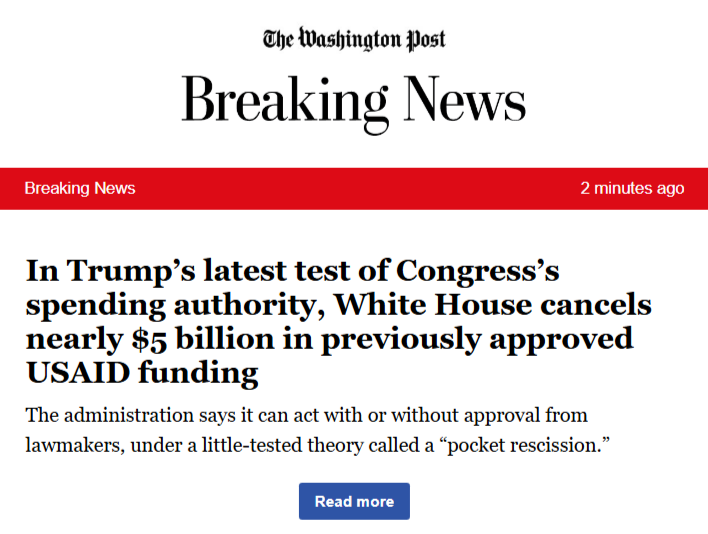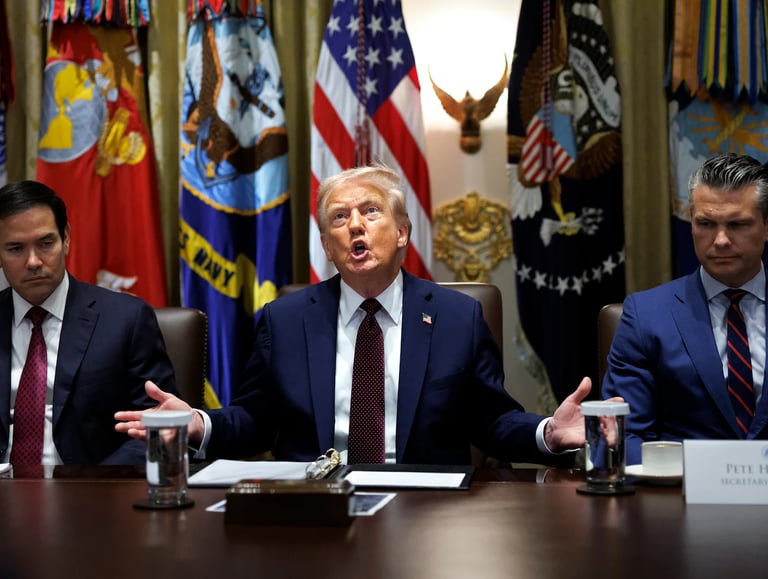Trump tries to wrest spending power from Congress as government shutdown looms
The administration says it can cancel nearly $5 billion in international aid with or without approval from lawmakers under a little-tested theory called a “pocket rescission.”
Washington Post
8/29/20253 min read


President Donald Trump moved late Thursday to cancel nearly $5 billion in congressionally approved funding for U.S. international assistance and diplomacy, setting up a fresh confrontation in the White House’s attempt to wrest constitutional spending power away from lawmakers.
The Republican chair of the Senate Appropriations Committee on Friday called the move an “attempt to undermine the law.”
The move risks complicating talks to avert a looming government shutdown deadline. Federal funding expires on Sept. 30, and without new spending laws, broad swaths of the government would shutter. Republicans control both chambers of Congress, but need support from Democrats in the Senate to pass new spending laws.


Trump and White House budget director Russell Vought took office with plans to challenge Congress’s power of the purse through impoundments, or unilateral moves to cancel legally mandated spending. Impoundments are illegal under a 1974 law that Vought has pledged to challenge in court.
But the White House can block funds in a different manner using a loophole in the statute: When the president asks Congress to rescind certain funding, those resources are frozen for 45 days.
By sending such a request to Congress within 45 days of the end of the fiscal year, Trump can essentially run out the clock on that funding and cancel it even if lawmakers don’t act through what’s known as a “pocket rescission.”
Congress returns from its August recess next week, but lawmakers in both parties blasted Trump’s action.
“Article I of the Constitution makes clear that Congress has the responsibility for the power of the purse,” Sen. Susan Collins (R-Maine), the Senate Appropriations chair, said in a statement.
“Any effort to rescind appropriated funds without congressional approval is a clear violation of the law.”
Sen. Patty Murray (Washington), the top Democrat on the panel, echoed the sentiment:
“Russell Vought would like us all to believe that making this rescissions request just weeks away from the end of the fiscal year provides some sort of get-out-of-jail free card for this administration to simply not spend investments Congress has made; it emphatically does not,” she said in a statement.”
Legal experts have made clear this scheme is illegal and so have my Republican colleagues.”
The top Senate Democrat said the result could be a shutdown: “As the country stares down next month’s government funding deadline on September 30, it is clear neither President Trump nor congressional Republicans have any plan to avoid a painful and entirely unnecessary shutdown,” Senate Minority Leader Charles E. Schumer (D-New York) said in a statement.
The last time a president used a pocket rescission to claim Congress’s spending authority was 1977.
The funds Trump canceled were largely intended for the U.S. Agency for International Development, a global peacekeeping and anti-poverty agency that the White House targeted for cost saving in the early days of Trump’s second presidency.
Other funds were meant for peacekeeping and democracy programs at the State Department.
Those funds — and Trump’s plan to shutter USAID — have been the subject of ongoing court battles.
A federal judge in February ruled that Trump could not freeze the international development funding, though that ruling was later scaled back by the Supreme Court.
A federal appeals court earlier this month held that the Trump administration could block the funds, but largely because the group suing the White House did not have the legal standing to do so.
The court found that only the Government Accountability Office, Congress’s watchdog, could bring that case against the president.
The leader of that office, Gene Dodaro, is set to leave his post in December. Trump will name his replacement, who must be confirmed by the Senate.
Congress voted in July to cancel about $9 billion in funds for foreign aid and public broadcasting that Trump had requested in an earlier rescission measure.
This new pocket rescission is less confrontational than many lawmakers had privately feared.
Republicans and Democrats alike were preparing for a scenario in which the White House attempted to canceled tens of billions of dollars from a variety of federal agencies, especially in health, science and education funding, which would have immediately scuttled government funding talks.
But Trump has largely shut down USAID, shutting the agency and moving core functions to the State Department.
Secretary of State Marco Rubio posted on social media Friday that he’d tapped Vought to oversee the final winding down of USAID.
Still, the White House is testing lawmakers’ patience over spending.
Records released last week revealed the administration was blocking low-income housing services, education assistance, medical research grants and other programs approved by Congress.
Before the White House Office of Management and Budget would release the funds, it demanded plans from agencies to show they are following guidance Trump has laid out in executive orders, such as a new ban on spending on diversity programs.
Many budget experts and legal scholars say that practice is illegal.
Political news, commentary for the enraged reader
contact@dailybeastie.com
© 2025 DailyBeastie.Com - All rights reserved.

